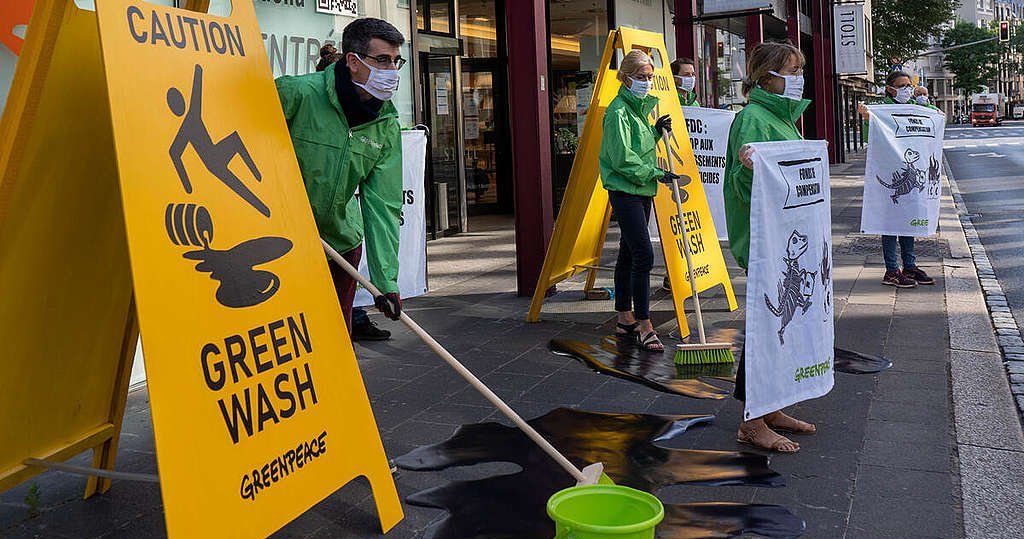Search “Greenpeace” and “carbon offsets” and you’ll get some surprising results.
At least, they’ll be surprising – if you still think that Greenpeace is anything less than beyond radical.
At a time when companies all around the world are gathering behind carbon credits & offsets.
Greenpeace is publishing articles like:
- “The Biggest Problem With Carbon Offsetting Is That It Doesn’t Really Work” – May, 2020
- “Why Relying On Offsets Won’t Stop Climate Breakdown” – October, 2020
- “Why Netzero and Offsets Won’t Solve the Climate Crisis” – June, 2021
The latest and greatest in Greenpeace’s single-handed war on carbon offsets landed a couple of week ago.
Jennifer Morgan, Executive Director for Greenpeace, called for a complete end to carbon offsets in a Reuters interview.
“There’s no time for offsets. We are in a climate emergency and we need phasing out of fossil fuels.”
Surprised? Greenpeace makes a three-part case against the voluntary carbon market:
- Offsets take too long/are unreliable
- Only radical decarbonization will reduce CO2 levels
- Offsets are mere greenwash
This “greenwashing” accusation is the heart of the matter. So, is Greenpeace onto something? Or are they once again ignoring the real benefits of carbon offsets in a push to achieve their own version of a perfect solution – one that doesn’t work in real life?
The Greenwash Accusation
More and more businesses are jumping into the Voluntary Carbon Market (VCM), expanding their own portfolio of offsets and using terms like “NetZero” and “carbon neutral” in their advertising.
The energy sector alone witnessed a 5x increase in offsets between 2020 and the first half of 2021!
In response, radical environmentalists like Greenpeace are increasingly deploying the greenwashing accusation as a means of discrediting any big-business solutions to the climate crisis.
Vast growth in the size of the VCM? Greenwashing!
Ever-increasing efforts to achieve carbon-neutral practices? Greenwashing!
Greenpeace raises some legitimate concerns with the current state of the young VCM. Most nature-based offsets do have a long lifespan – 20 years or more – but they get applied instantly. Forests can burn or become diseased, and the overall impact of a given offset may not always be what was predicted.
At the same time, calling the entire VCM greenwashing hints at a darker motivation:
Greenpeace doesn’t think businesses can or should solve their own problems.
No one denies that the same business sectors that drive our modern world are also responsible for the vast majority of GHG emissions.
But Greenpeace, and their allies, don’t think that businesses should have a voluntary role in addressing those issues. The key word there is voluntary – governments should, in Greenpeace’s solution, play a far more active role in forcing big business to decarbonize.
What Greenpeace suggests is simple, but not reasonable: massive reduction in GHG emissions as fast as possible, even when that reduction would cripple or transform entire sectors of the economy.
The only way to decarbonize that quickly is to reduce production and consumption in those sectors. That means dramatically reducing the amount of meat and dairy products people consume.
What would the impact be on rural communities? How would that transformation affect the agricultural and meat-producing sectors more broadly?
These are questions Greenpeace doesn’t answer, instead they falling back on their claims about how dire the need is.
Offsets: part of a real-world solution to the climate crisis
Lost in Greenpeace’s protests is the fact that carbon offsets and the VCM are real-world solutions to real-world problems. The VCM allows farmers to shift production, turning farmland into grassland or forests for offsets.
Those offsets provide a much-needed revenue stream for those farmers, easing the transition. In fact, some offsets, like no-till farming, provide environmentally-friendly ways to continue production and still achieve GHG reductions.
Is the VCM perfect? No. But it’s worth remembering three things:
- The VCM is in the early stages
- Standards are improving
- VCM growth recognizes the problem
Offsets have only taken off in the past decade. Growth has been meteoric in the past few years, but the market is still young. Like all emerging markets, standards will improve and companies can adjust to increasing regulation and best practices.
Finally, what Greenpeace fails to see is that the VCM is a genuine recognition of the problem. It may not be a perfect solution, but the rapid growth of the VCM speaks to a growing recognition of the climate change problem.
For that, Greenpeace should be praising the VCM – Not revolting against it.

